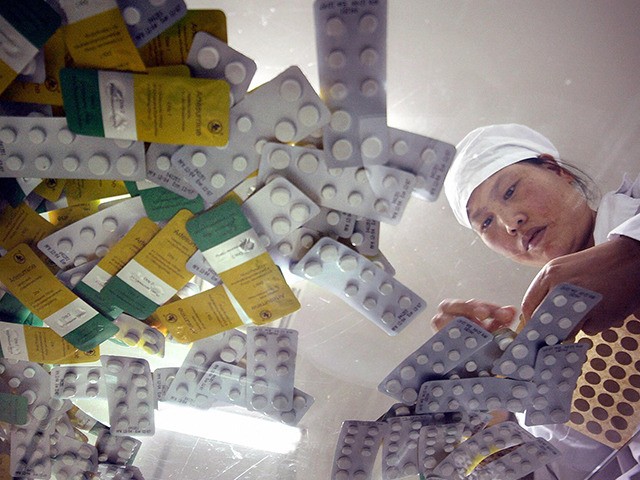Rep. Michael Waltz (R-FL) will introduce a bill this week to lessen America’s dependence on Chinese pharmaceuticals and reduce the risk to the its supply chains, his office said in a statement on Monday.
“Coronavirus has unfortunately been a wake-up call to the danger of American reliance on a hostile foreign power like China for medical supplies,” Waltz said in a statement.
“We must identify our supply chain vulnerabilities and build out domestic capacity to eliminate dependence on China and other nations, for the safety and health of all Americans,” he said.
The bill, dubbed Strengthening America’s Supply Chain and National Security Act, is sponsored by Sens. Marco Rubio (R-FL), Kevin Cramer (R-ND), Tim Kaine (D-VA), Chris Murphy (D-CT) and Elizabeth Warren (D-MA) in the Senate.
The bill will direct the Pentagon to determine the extent of its dependency on foreign entities for drugs, active pharmaceutical ingredients (API), and pharmaceutical components and whether this dependency creates a national security risk and create recommendations to eliminate this issue.
It would also restore the Buy American Act’s intent for Pentagon and Department of Veterans Affairs (VA) purchases.
The U.S. Court of Federal Claims on February 10 ruled that the country of origin for for pharmaceuticals is where the manufacture of the final product occurs, not where the API is sourced.
According to Waltz, the ruling could open the door to allowing more pharmaceuticals with APIs primarily based in China to qualify for preference under the Buy American Act. Waltz’s bill would restore the process in place before the ruling.
The bill would also require drug makers to provide the Food and Drug Administration (FDA) with information to determine volume of APIs used in pharmaceuticals.
Currently, the FDA requires drug makers to identify the sources of the drug’s API, but not the volume of API from each source, making it impossible for the FDA to determine the extent of dependency or risks for drug shortages, according to Waltz.
Rubio said in a statement:
Over a year ago, I warned about our nation’s critical vulnerabilities and supply chain risk in key sectors of our economy, including the medical supply chain, as a result of decades of lost industrial capacity to China. The industrial capacity of a nation still matters, and we are learning a painful lesson as a result of the coronavirus pandemic. Once our nation has recovered from this unprecedented crisis, we must take steps to address the systemic vulnerability and supply chain risk that the coronavirus pandemic revealed. It is unfortunate that it took a global pandemic to make clear the ramifications of offshoring our industrial base to countries like China. This legislation represents a serious, bipartisan effort to prioritize the rebuilding of our nation’s productive capacity.
Cramer added:
The United States government should never accept the unnecessary and avoidable risk of allowing our medical supply chain to be disrupted. If American lives depend on these drugs, we should not depend on foreign adversaries to get them. Our bill rightly reprioritizes the Buy American Act and directs the relevant federal agencies to detail how much we rely on other countries for pharmaceutical ingredients.
Kaine said:
This pandemic has further underscored the need to look at health care through a national security lens. It’s critically important that we gain more knowledge of and control over our medical supply chains to reduce our reliance on other nations and ensure adequate supply in times of crisis. I’m proud of this bipartisan legislation that will allow our federal agencies to determine how the U.S. can strengthen our security and our supply chains.
Murphy said:
Coronavirus has exposed a serious risk in our supply chain. Being dependent on China for pharmaceuticals — especially at the height of this pandemic — poses a serious threat to U.S. national security and public health across this country. I’m glad to work with a group of bipartisan senators to prioritize American manufacturers and ensure adequate pharmaceutical supply throughout this crisis and beyond.
Warren added:
The coronavirus pandemic has made clear what we’ve known for years: that our dependence on drugs and drug components imported from China and other countries is a threat to our national security and our public health,” Warren said. “This bipartisan bill proposes commonsense solutions to start addressing this problem and I’ll keep fighting to secure our drug supply chain and boost manufacturing here in the United States.
Follow Breitbart News’s Kristina Wong on Twitter or on Facebook.

COMMENTS
Please let us know if you're having issues with commenting.